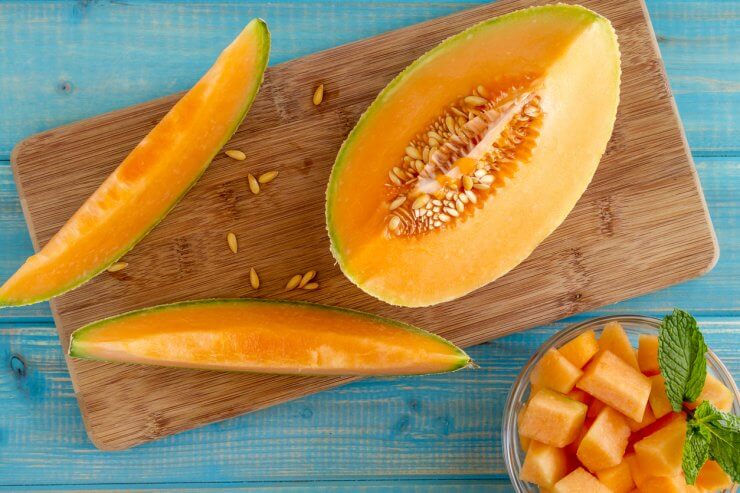
Cantaloupe melon slices on cutting board
The melon is one powerful fruit! Rich in antioxidants and plant compounds, melons can protect your heart, increase good (HDL) cholesterol, lower your blood pressure, protect against cancer, and help control blood sugar. The vitamin C in melons helps boost your immune system and helps neutralize free radicals in your body. And your body can’t store vitamin C, so you need to be sure to get your daily requirement.
Here are some of the other ways melons contribute to good health—plus a couple notes of caution.
Heart health
Heart disease is the most common form of death worldwide. Consumption of fruits high in vitamin C, like melons, has been linked to reduced heart disease and lower blood pressure.
Vitamin C also contributes to lower incidences of stroke, especially among people who are overweight or have high blood pressure.
The fiber in melons can also help decrease LDL (bad) blood cholesterol levels.
Bone Health
You won’t meet your body’s needs for the full daily recommended amount of folate, vitamin K, and magnesium by having melon with breakfast, but melon does provide a small amount of those nutrients, which contribute to overall bone health.
Better Blood Sugar
Some research indicates that eating fresh fruit helps your body better regulate blood sugar levels. A study of half a million people indicated that those who ate fruit daily were 12 percent less likely to develop diabetes, compared to those people who rarely ate fruit. Now, melons do have carbs, and some melons are really sweet. But from a health standpoint, the fiber and other nutrients in melons still makes them a better choice than, say, chips or ice cream.
Cancer prevention
Studies have linked some of the components of melons to a possible reduction in the risk of many types of cancer. Researchers have been taking a closer look at the seeds and the rind of melons for their cancer-fighting properties.
Weight loss & good hydration
Melons contain soluble fiber and are about 90 percent water, so having melon with a meal may help people feel full sooner and resist cravings. They also have electrolytes to help you stay properly hydrated.
Digestive health
Melons have high levels of soluble dietary fiber. That’s great news for people who occasionally experience constipation or suffer from other gastrointestinal issues.
Pregnancy health
Folate is essential for the healthy development of babies in order to prevent neural tube defects, such as spina bifida. Prenatal vitamins include folate (also called vitamin B9), but melons are a great natural source of this essential vitamin.
Skin health
The vitamin C in melons may contribute to healthier skin—reducing the development of wrinkles and contributing to more hydrated skin and fewer blemishes.
Melon hazards
You can get too much of a good thing, and in the case of cantaloupe, too much potassium can adversely affect your kidneys. If you overdo it with foods containing potassium, your system can wind up on overload and you can develop a condition called hyperkalemia. This can damage your kidneys and increase your risk of heart attack.
Digestive toss-up
While the fiber in melons can be beneficial, it can also be irritating. How it affects you depends on your system. While the fiber is great for keeping a digestive system in good shape, it can also trigger diarrhea, stomach cramps, and other intestinal issues. If you’ve had bowel surgery, cancer, or have an inflammatory bowel condition, check with your doctor before digging into that fruit bowl.
Household uses
Melons can be kind to your skin:
- For a natural makeup remover, puree the pulp of half a melon with 3 tablespoons of cottage cheese (preferably not the fat-free variety). Spread on your face and work into your skin to remove makeup. Store this natural product in an airtight container in the fridge.
- Does your skin need a little brightening? Keep some melon juice handy in a sealed jar in the fridge. When you need that extra glow, dip a cotton ball into the juice and spread it gently over your face. Say aah.
First aid
A slice of melon can help soothe the pain of skin abrasions, burns, and sunburn.
Did you know that melons are so healthful? Did you know about the potential pitfalls of consuming melons? What about the household uses? Please tell us how you use melons.



